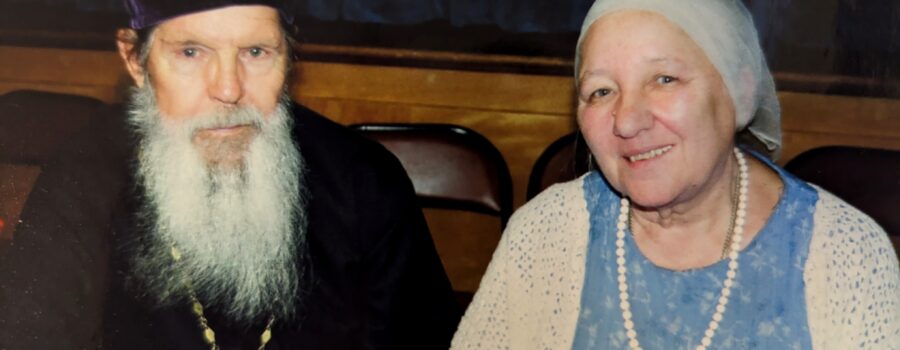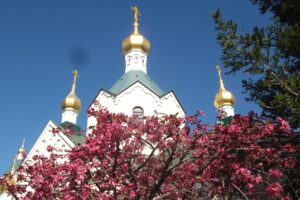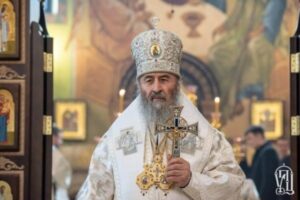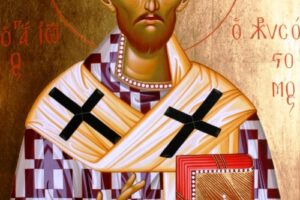Margarita Vladimirovna Poluektova, née Lebedeva, was born in June of 1937 in the staff quarters of the Ekaterininsky Palace in Pushkin, now known as Tsarskoye Selo, Russia. Her father Vladimir and mother Claudia lived together with her grandfather, who was one of sixteen servants who personally served Tsar Nicholas II. Her grandfather Matthew was the church warden at the Znamenskaya church, where he just managed to have the newborn Margarita baptized before he was arrested on August 19 and martyred by the Bolsheviks on October 4, 1937.
She remembered that, as a young child, her father, Vladimir, left the family several sacks of grain and potatoes before being sent to fight in Finland. When the war reached the outskirts of Leningrad, Margarita and her older sister Evgenia, along with their mother, began evacuating toward Belarus. En route, Margarita’s mother, Claudia, died in Latvia and she and her sister were left on their own there. Their father was a prisoner of war in Germany at the time.
Margarita (on right in photo at left) was adopted by a childless couple, Aunt Katherine and Uncle Leonard, who were Russian Latvian landowners. As the war intensified, they were forced to leave their prosperous estate. They loaded their possessions onto a horse-drawn cart and evacuated to Riga, and from there to Germany. Margarita and her adoptive parents moved from refugee camp to refugee camp during the war. She often remembered how the family found themselves outside of Dresden on the eve of the infamous firebombing. Her adoptive father was unable to find work in the city because he was sick with tuberculosis. So they had to live on the outskirts, which probably saved their lives. She described days and nights of watching bombers flying overhead, too frightened to stay in the cellar or to remain outside.
When the war ended, the refugees from the camps started immigrating to countries worldwide. But her family could not get a visa because of Uncle Leonard’s tuberculosis. So until 1954, they moved from camp to camp as they consolidated. When her adoptive father died, she and Aunt Katherine got a visa to travel to New York in 1954. There, she worked and took care of her adoptive mother until she died in 1962. That year, Margarita met her future husband, Alexey Poluektov, and they married in 1963.
Their daughter, Kira, and son, Ilya (photo at right), were born soon thereafter. In 1967, she and her newly ordained husband moved to San Francisco, where he was assigned as rector of Our Lady of Kazan Russian Orthodox Church in the Richmond District. Their youngest son, John, was born several years later. Along with caring for the children, she helped Fr. Alexey at the Kazan Church. She also supported St. Elias Publications, a home printing shop, which published religious pamphlets and books in the Russian language.
Her family moved from San Francisco to Forestville, California, in Sonoma County, and for the next several decades, life focused around family, church, and printing. In the early 1990s after the Soviet Union fell, there was a great thirst for religious literature in Russia. Margarita and Fr. Alexey sent thousands of books that they printed for free to anyone who requested them. After many years, she was able to visit Russia and reunite with her father, her sister, her half-sister, and other close relatives.
Margarita was blessed with strong creative abilities, intuition, and a green thumb. Like many women—and especially matushki—her contributions were quiet and invisible. Her artistic gifts were evident from early childhood. She liked to draw and paint and eventually earned a certificate in graphic design from Santa Rosa Junior College. Many of these skills were directed toward the Kazan Church, which was considered to be one of the most beautiful in the area. She sewed vestments, made piroshki, and helped grow flowers, fruits, and vegetables, which were often brought to the church. They raised chickens and kept bees, and the baklava made with the honey they produced was in high demand. She was an excellent cook and a motherly, nurturing person.
Like many immigrants, she was able to live on a shoestring and still create works of beauty. This was a gift she and Father Alexey shared. They had a cheerful ability to make do with what they had, with great self-reliance and survival skills. Both were very prudent financially and made few demands on others. As a result, when Father Alexey retired, he left the church in excellent financial condition.
Margarita made the time to listen to people and to make them feel included and understood. She had a wide circle of friends who enjoyed her good humor and supportive nature.
Ten years after retirement, Fr. Alexey’s health started failing, and Matushka took care of him. Father continued to serve as he was able at Sts. Peter and Paul church in Santa Rosa. She also cared for their son Ilya, who found himself in a wheelchair after an accidental fall that had left him partially paralyzed. Father Alexey died in 2010, and Margarita then lived with their daughter, Kira, at the Russian River.
Matushka Margarita reposed peacefully at home on April 22, 2023, during Bright Week. May God rest her soul in the heavenly mansions, where all the saints dwell!
Memory eternal!




